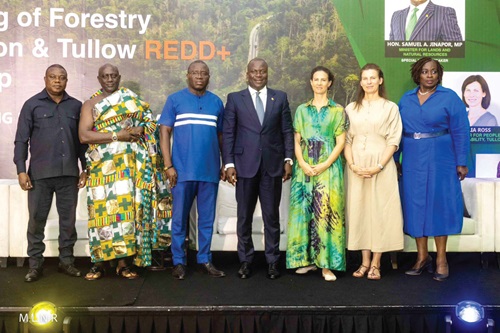The government has signed a historic Emissions Reductions Purchase Agreement (ERPA) with Tullow Oil Plc, marking a significant milestone in efforts to address deforestation and forest degradation.
Under the project, over two million hectares of land in 14 districts in the Bono and Bono East regions will be used to plant various trees and implement other carbon credit innovations.
More trees, forest cover and other interventions that sustain the environment will help to reduce the country’s carbon footprints, thereby qualifying it to apply for payments, known as carbon credits.
The partnership will promote sustainable land use and forest conservation, while generating revenue for local communities and supporting the country’s climate change mitigation efforts.
The Ministry of Lands and Natural Resources and its agency, the Forestry Commission, signed the agreement with the Jubilee and the Tweneboa, Ntomme and Enyera oil fields lead operator which will finance it .
The agreement, launched by the parties at a ceremony in Accra yesterday, represents a major step forward in Ghana’s commitment to sustainable development and environmental stewardship.
The Minister of Lands and Natural Resources, Samuel A. Jinapor, said the agreement represented a significant milestone in the country’s efforts to address deforestation and forest degradation, while promoting sustainable development and environmental stewardship.
“Undoubtedly, the ERPA we have signed with Tullow Oil Plc, also represents a key voluntary carbon market transaction, which is very unique, as it promotes direct government and private sector engagement, removing any intermediary bureaucracy to accelerate the speed of delivery of ambition and climate finance,” he said.
Additionally, he said, the agreement represented the highest price per tonne of carbon for any direct sale of forest carbon transaction in West Africa. ‘This illustrates the confidence of the parties to compensate for the efforts it takes to generate a tonne of carbon,” he added.
Bold, ambitious
Mr Jinapor hailed the agreement as a “bold and ambitious” initiative that demonstrated Ghana’s leadership in addressing the global challenge of climate change. He emphasised the importance of fair pricing of carbon credits, noting that Ghana’s partnership with Tullow set a new benchmark for carbon pricing in the region.
The ERPA is part of Ghana’s broader efforts to promote sustainable forest management and reduce deforestation and forest degradation.
Progress
Mr Jinapor, who is also the Member of Parliament (MP) for Damongo, said the country had made significant progress in recent years, with initiatives such as the Ghana Cocoa Forest REDD+ Programme and the Ghana Shea Landscape Emission Reductions Project.
This partnership with Tullow, he said, was expected to generate significant revenue for local communities and support Ghana’s climate change mitigation efforts. The Director for People and Sustainability at Tullow, Julia Ross, said the EPRA was a significant moment in Tullow’s journey towards achieving its net zero ambition by 2030.
She added that as part of the ERPA, the company had made a commitment of a sizeable financial investment of $90 million over a 10-year period, “which will impact around one million lives, and deliver up to a million tonnes of carbon offset credits per year.”
Over the past two years, Tullow had worked closely with the Forestry Commission to develop a REDD+ programme that would deliver carbon offsets or verified emission reductions (VERs), Ms Ross said.
“This is Tullow’s first REDD+ project and we have benefited greatly from the depth of knowledge and experience that exists in Ghana’s Forestry Commission and the leadership Ghana has taken as a country in halting and reversing deforestation and forest degradation,” she added.
Ms Ross said the REDD+ programme would preserve large areas of forest, across the 14 districts in the Bono and Bono East regions which were among the areas most affected by deforestation, resulting from economic activities such as cash crop clearance and overgrazing.
Solidarity messages
In her solidarity statement, the British High Commissioner, Harriet Thompson, said she was proud of Ghana as it continued to show dedication to curtailing forest degradation and mitigating climate change.
She stated that with Ghana’s enthusiasm, the British Government saw this as just the beginning of many successes. Ms Thompson congratulated the team at Tullow and the Forestry Commission for the height achieved, and encouraged other organisations to follow this example, that “doing this is good for the business, good for the climate and good for the people”.
The Chief Executive CEO) of the Forestry Commission, John Allotey, indicated that the project would span a decade and position the Forestry Commission as a major source of approved and reliable carbon credit.
He also emphasised the commitment of the Forestry Commission to the production of high integrity carbon credit that would appeal to the international market, John Kwabena Abbam Aboah Sanie, commended the partners; Forestry Commission and Tullow, for the efforts in reaching such a height, and expressed the hope that the REDD+ Project would yield the highest results.




































